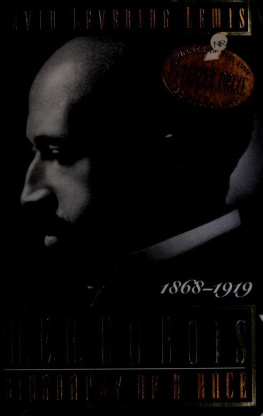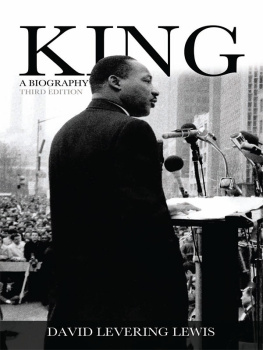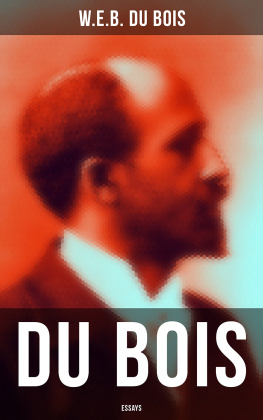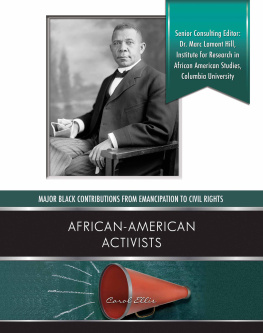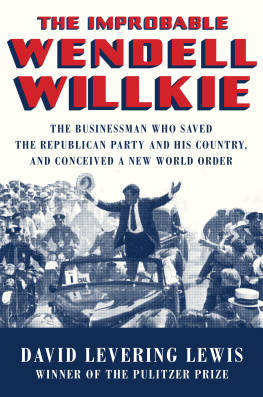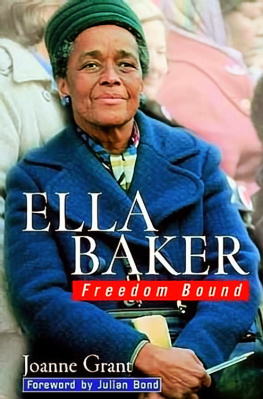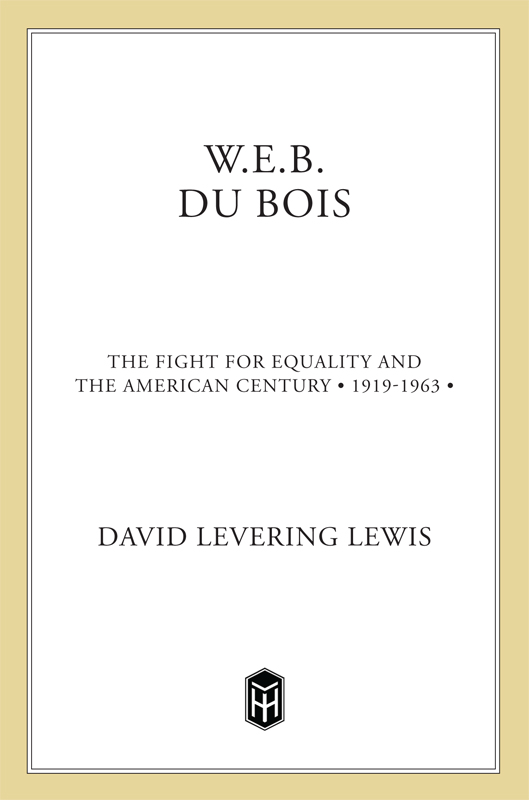
The author and publisher have provided this e-book to you for your personal use only. You may not make this e-book publicly available in any way. Copyright infringement is against the law. If you believe the copy of this e-book you are reading infringes on the authors copyright, please notify the publisher at: us.macmillanusa.com/piracy.
CONTENTS
Ad Ruth vitae salvatorem
Had it not been for the race problem early thrust upon me and enveloping me, I should have probably been an unquestioning worshipper at the shrine of the established social order into which I was born. But just that part of this order which seemed to most of my fellows nearest perfection seemed to me most inequitable and wrong; and starting from that critique, I gradually, as the years went by, found other things to question in my environment.
W.E.B. Du Bois, The Autobiography: A Soliloquy on Viewing My Life from the Last Decade of Its First Century
ACKNOWLEDGMENTS
Fifteen years ago, I began the reading, researching, interviewing, and writing that produced in the winter of 199394 a biography of fifty-one years in the life of William Edward Burghardt Du Bois. The assistance of several hundred people on four continents and the cooperation of a dozen institutions in this country and abroad have enabled me to complete the remaining extraordinary forty-four years from 1919 to 1963. Few twentieth-century Americans lives were as productive, multiple, controversial, and emblematic as Du Boissand almost none as long. Volume one1868 to 1919was rather ambitiously subtitled Biography of a Race. Ultimately, prudence dictated that I not call volume two the biography of a century, although that desire still resonates in the chosen subtitle. Moreover, because of the generosity of many, the insightfulness of some, and the labors of more than a few, this final effort is, in a real sense, a biography by committee. But I have spoken to and corresponded with so many people in so many places over so many years that, inescapably, there will be omissions from the following list of names. My remorse in failing to thank them is as profound as is my gratitude to those who are acknowledged (posthumously in several cases) below.
To one person above all othersexcept my wifeI owe an incommensurable debt: Herbert Aptheker. Although his views of my subject differ in significant ways from my own, without Professor Apthekers editions of the selected correspondence, periodical literature, Crisis editorials, newspaper columns, and invaluable introductions to the complete run of the published monographs of W.E.B. Du Bois, any attempt to write a comprehensive life and times would have required richer resources and greater endurance than this biographer cares to contemplate.
Others in the United States to whom a prioritized debt of gratitude is owed are those who read portions of the manuscript, shared their own particularly pertinent scholarship, or called attention to significant persons, matters, or sources I might otherwise not have discovered.
At Rutgers University, my colleagues Paul Clemens, William Gillette, and Donald Roden read and critiqued chapters; as did John Hope Franklin at Duke University, Irwin Gellman at Chapman University, Paula Giddings at Duke (who indulged endless therapeutic telephone calls), Robert Hill at UCLA, Kenneth Janken at University of North CarolinaChapel Hill, August Meier (emeritus) Kent State University, Wilson J. Moses at Pennsylvania State University, Arnold Rampersad at Stanford University, and Claudia Tate at Princeton University.
Those who volunteered information and responded to pleas were Rae Alexander-Minter at Rutgers, David Anthony III at UC Santa Cruz, Edward Beliaev at the Harriman Institute (Columbia), Esme Bhan at Howard University, Leonard Bethel at Rutgers, Faith Berry at UC Santa Barbara, John Bracey at University of MassachusettsAmherst, Marcus Bruce at Bates College, ALelia Bundles at NBC, Jack Cargill at Rutgers, Johnnetta Cole at Spelman College, Leslie Collins at Fisk University, Maceo Dailey at University of TexasEl Paso, Martin Duberman at CUNY, Gabrielle Edgecomb (deceased) of Washington, D.C., Vanessa Gamble at University of Wisconsin-Madison, Marvin Gettleman (emeritus) Polytechnic University, Justin Hart at Rutgers, Walter Hill at the National Archives, Allen Howard at Rutgers, Spencer Jourdain at MetaStar, Inc., Kiyofumi Tsubaki at Tuda College (Japan), Peter Lau at Rutgers, Wilson J. Moses at Pennsylvania State University, Kathy Nicastro at the National Archives, Richard Newman at Harvard, Brenda Gayle Plummer at University of WisconsinMadison, Paul Robeson, Jr., of Brooklyn, Barbara Savage at University of Pennsylvania, Arthur Schlesinger, Jr. (emeritus), CUNY, Victor Schuster at Einstein College of Medicine, Ann Shockley at Fisk, William Strickland at University of Massachusetts-Amherst, Jerry Thornberry at the Gilman School, Richard Thornell at Howard University Law School, Ernestein Walker (emerita), Morgan State University, Carolyn Wedin at University of WisconsinWhitewater, Deborah Gray White at Rutgers, Sondra K. Wilson of New York City, Du Bois Williams at Xavier University, C. Vann Woodward (deceased) at Yale.
I wish to thank those who especially facilitated the progress of this biography in Western Europe. Berlin (former German Democratic Republic): Ollie Harrington (deceased); Kay Panke (deceased); and Irene Runge. Brussels: Robin and Simon Hinson-Jones, Victor and Mady Loewenstein. London: Paul Bremen; Cameron Duodu; Heywot (Gretta) and Yawand-Wossen Mangasha. Paris: Barbara Chase-Riboud, Ruth Lazarus.
I extend the same appreciation to those who were of assistance in the former Union of Soviet Socialist Republics. Kiev: Igor Semida. Moscow: Alexei Andreyev, Carl Bloice, Lili Golden, Ovid and Alla Bobricheva Gorchakov, Alia and Alexei Grechurkin, Rhobert Ivanov, Elena Kanga, Tatiana Kudriavtseva, Frieda Lurie; Yuri Surovtsev; and Afanasy Vesilitsky. St. Petersburg: Ina Smirnova. Tashkent: Ulugbek Eshtaev.
In Accra, Ghana, Du Boiss final resting place, the following individuals were exceptionally cooperative: Adu Boahen; Robert and Sara (deceased) Lee; Owusu of Hertz; Efua Sutherland (deceased); J. O. Vanderpuye.
Of my excellent research assistants, Charles Cooney, Kimn Carlton-Smith, Florice Kovan, and Betty Gubert, it could be said that they performed the difficult on the appointed day, then took an extra day to do the impossible. The death of two computers might have spelled the death of the Du Bois biography along with its author, but for the wizardry of Robert De Mariano. For the efficient, timely transcription of some 150 taped interviews, some in poor quality and several in Russian, I thank Carol Grant of Pro-Typist. I thank Robert Arons for his fascinating limousine-service lectures.
In the final phase of preparation, six persons labored indefatigably as a team for three weeks of eight-hour days decoding, checking, and supplementing where necessary an ocean of end notes in order to make it possible for the author to deliver the manuscript in time to appear before the end of the twentieth century. My gratitude to Matthew Guterl, my former graduate student and now fellow author (who provided close reading of several chapters); Khalil Muhammad and William Jelani Cobb, my graduate students and authors to be; David Brighouse, my model honors student now a graduate scholar; and Betty Gubert and Alice Adamczyk, librarians extraordinaire, formerly of the Schomburg Center for Research in Black Culture, is everlasting.


